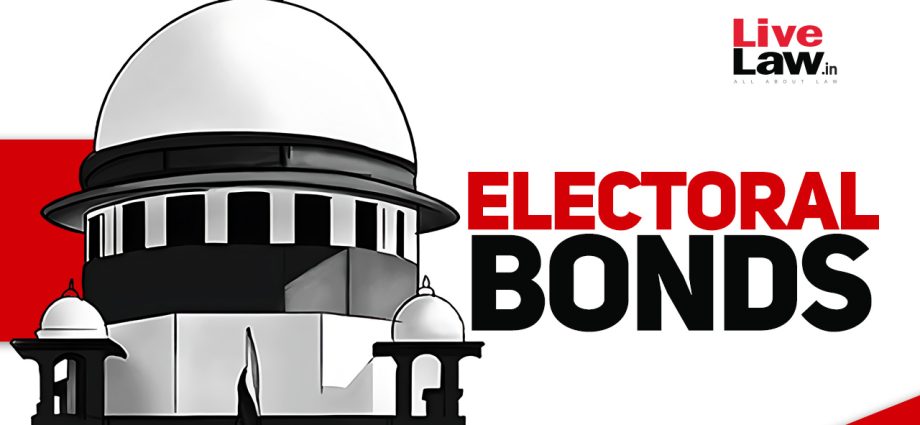By Jessy Kurian
New Delhi, Feb 20, 2024: A Constitution Bench of the Supreme Court on February 15 unanimously struck down the anonymous Electoral Bonds Scheme stating, that it violated the right to information under Article 19(1)(a) of the Constitution and therefore it is unconstitutional.
The Centre’s Electoral Bonds Scheme facilitated anonymous political donations. The Central Government introduced certain amendments through the Finance Act, 2017.
The amendments made three key changes, such as: (1) An amendment to the Representation of the People Act, 1951 (RoPA), that exempted the political parties from publishing the details of contributions received through electoral bonds in “Contribution Reports.”
(2) Amendment to the Income Tax Act 1961, that exempted the political parties from keeping a detailed record of contributions received through Electoral Bonds. (3) Amendment to the Companies ACT, 2013, that removed any obligation on companies to maintain details of donations made to political parties- a simple total figure was deemed sufficient.
There were two crucial questions before the Constitution Bench comprising Chief Justice DY Chandrachud and Justices Sanjiv Khanna, BR Gavai, J B Pardiwals and Manoj Misra.
First was, whether the non-disclosure of information on voluntary contributions to political parties according to the Electoral Bonds Scheme and the amendments to Section 29C of Representation of the People Act, Section 13A (b) of the Income Tax Act were violative of the right to information under Article 19(1) (a) of the Constitution.
The second was, whether unlimited corporate funding to political parties as envisaged by the amendment to Section 182 (1) of the Companies Act violated the principles of free and fair elections.
Chief Justice, DY Chandrachud at the outset emphasized the importance of open governance and held that the Electoral Bonds Scheme violated Article 19(1)(a) of the Constitution. The court held that the scheme by permitting anonymous political donations infringed upon the fundamental right to information under Article 19(1)(a) of the Constitution.
It pointed out that such amendments restrict fulfilling the freedom of speech and expression. The right to information plays a key role in furthering participatory democracy by holding the government accountable.
At a primary level, political contributions give a seat at the table to contributors, i.e. it enhances access to legislators. This access also translates to influence over policymaking. There is also a legitimate possibility that financial contributions to a political party would lead to quid pro quo arrangement because of the close nexus between money and politics.
The petitioners contended that ‘anonymity’ is associated with electoral bonds undermines transparency in political funding and encroaches upon voter’s right to information.
On the other hand, the Union Government argued that the amendments introduced through the 2016 and 2017 Finance Acts and the subsequent Scheme were economic policies and the Court must exercise restraint in deciding the case, due to the pre-eminence and primary role of the Legislature and the Executive in matters concerning economic policy.
However, the court declined to accept such contention of the government and passed the following directions
1. The issuing bank shall herewith stop the issuance of electoral bonds
2. The State bank of India shall submit the details of electoral bonds purchased since the interim order of the Court dated April 12, 2019, till date to the Election Commission of India.
3. State Bank of India shall submit the details of the political parties which have received contributions through electoral bonds since the interim order dated April 12, 2019.
4. SBI shall submit the above information to the ECI within three weeks and by March 6.
5. ECI shall publish the information received from the SBI on its website by March 13.
6. Electoral Bonds which are within the validity period of 15 days but which have not been encashed by the political parties yet shall be returned by the political party to the purchaser. The issuing bank shall then refund the amount to the purchaser’s account
In the present case, in “Association for Democratic Reforms &Anr. Vs Union of India &Ors,” Writ Petition (Civil) No.880 of 2017, the Bench finally held, “Information about funding to a political party is essential for a voter to exercise their freedom to vote in an effective manner.”
This is the judgment that upheld the dignity of the voter and his/her right to know the source of funding by the political parties. The judgement establishes transparency against corruption and anonymity.
I am happy that we are also a party to this case, against corruption through our NGO, “Citizen’s Rights Trust.”
Yes, the voter is the king and not the ruler.
(Sister Jessy Kurian is an advocate of the Supreme Court.)











